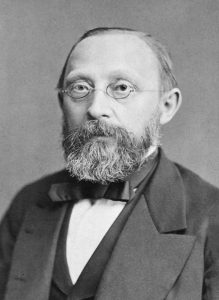History

Well over a century ago, the physician scientist Rudolf Virchow urged the world to study disease across a variety of species. Although cancer affects every mammalian species on the planet, most efforts to fight cancer have focused solely on humans. The Duke Comparative Oncology Group seeks to cross barriers between species in an effort to understand, and defeat, a common enemy. We are a consortium of researchers, medical doctors, and veterinarians at Duke University who work collaboratively with researchers at other institutions, including NC State University’s College of Veterinary Medicine, and the Triangle Veterinary Referral Hospital. Our goal is to combat cancer using a cross-species approach, meaning we study and compare naturally occurring cancers in humans and animals in order to benefit both species with better treatments and outcomes. With the collective effort of research universities, medical and veterinary schools, and the strong Pharmaceutical presence in the Triangle, we are well-positioned to make rapid advances. The Duke Comparative Oncology Group aims to serve as a model for integration and alignment of canine and human cancer care and research.
What is Comparative Oncology? Comparative Oncology is the study of naturally occurring cancer in animals and the comparison to its human counterpart for better understanding of cancer biology and to achieve treatments and cures that benefit both humans and animals.
 What is the One Health Initiative? Comparative Oncology is one important part of the “One Medicine” or “One Health Initiative”. This One Health Initiative is a worldwide strategy for expanding interdisciplinary collaborations in all aspects of health care for humans, animals, and the environment, recognizing the close connections between human, animal, and environmental health. Both the American Medical Association and the American Veterinary Medical Association, among others, have endorsed this strategy of encouraging cooperation and collaboration between physicians, veterinarians, and other health and environmental researchers to improve the health and well-being of all species.
What is the One Health Initiative? Comparative Oncology is one important part of the “One Medicine” or “One Health Initiative”. This One Health Initiative is a worldwide strategy for expanding interdisciplinary collaborations in all aspects of health care for humans, animals, and the environment, recognizing the close connections between human, animal, and environmental health. Both the American Medical Association and the American Veterinary Medical Association, among others, have endorsed this strategy of encouraging cooperation and collaboration between physicians, veterinarians, and other health and environmental researchers to improve the health and well-being of all species.
This concept of One Health is gaining momentum and being re-discovered by the current medical and veterinary communities, however it dates back to the late 1800’s. Rudolph Virchow (1821-1902) was one of the 19th century’s foremost leaders in medicine, and he is considered the Father of Modern Pathology. He noted the link between diseases of humans and animals and coined the term “zoonosis”. He famously stated, “Between animal and human medicine, there is no dividing line- nor should there be. The object is different but the experience obtained constitutes the basis of all medicine.”
